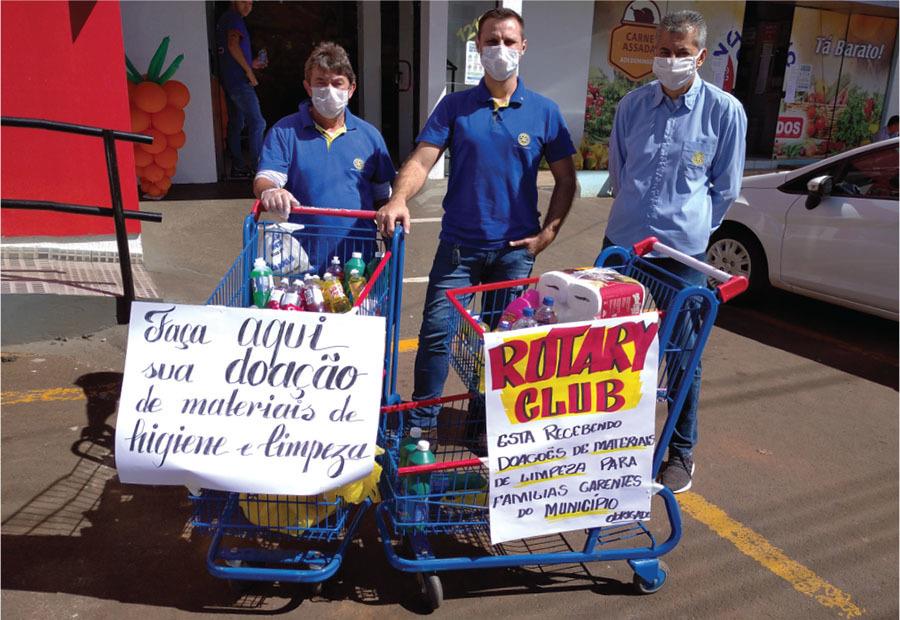
Clubs around the world respond to the pandemic
SINCE THE COVID-19 PANDEMIC BEGAN, Rotarians — whether they are small-business owners, health care workers, teachers, or government officials — have been carrying out vital services as part of their day-to-day work. And as members of their Rotary clubs, they have also been coming up with creative ways to support people who are affected by the pandemic. In all parts of the world, clubs are playing a crucial role in providing the help their communities need most right now.
Carl-Ludwig Dörwald of the Rotary Club of Worpswede was frustrated by the lack of masks and protective clothing for medical workers in Germany. He had lived in China for almost 20 years and witnessed the SARS epidemic in Beijing, so he turned to friends there and managed to secure a shipment of masks. Fellow Rotarians in Germany have helped to organize distribution of the masks to hospitals in Bremen, Bremervörde, Munich, and Oldenburg. Rotarians from Germany, Austria, and Switzerland are contacting Dörwald to offer their help. "We see what is needed in the crisis. We should intervene where we can help with our contacts, our knowledge, and our energy," says Dörwald.
Elsewhere in Germany, Rotarians are involved in a project called Care4Bayreuth, which delivers food to people in need in that Bavarian town. Rotaract clubs are assisting with grocery shopping for people who cannot leave their homes as well as for medical workers.
It’s a similar story in France. The Rotary clubs of Boulogne-Billancourt, Fréjus, and Martigues Étang-de-Berre have been supporting doctors, nurses, firefighters, and other essential workers by organizing meals cooked by Rotarian chefs and providing rental cars for workers unable to use public transit. The Aubergenville-Seine-Mauldre and Verrières-le-Buisson clubs, meanwhile, are focusing on collecting for food banks, as well as organizing blood donations. Clubs in Annecy, Grenoble, Montpellier, Nîmes, and Versailles have been making protective visors and sourcing ventilators.
In Portugal, Rotarians are ensuring that hospitals have the necessary equipment to treat patients by procuring personal protective equipment.
In Turkey, districts have been raising money to purchase medical equipment requested by hospital administrators. Thanks to The Rotary Foundation’s decisions to make disaster response grants available and to waive the international financing requirement for global grants focused on pandemic relief, District 2420 is working on a $210,000 project to provide CT scanners, District 2430 has secured funding to supply at least one hospital with a ventilator, and District 2440 is aiming to fund 10 ventilators.
Many Rotary clubs have tapped into their experience working with or running food banks to respond to the crisis. Some clubs, such as the Rotary Club of Rolândia-Caviúna, Brazil, have made masks for hospitals and health care workers.
In Italy, clubs in District 2080 are also raising funds to purchase ventilators and protective gear for hospitals and have collected more than $21,000 for masks. Clubs in District 2041 raised funds to buy protective gear for health workers at a field hospital set up at Milan’s fairgrounds.
In Spain, clubs have launched a collective effort under the banner of "We respond against loneliness." Rotarians are providing telephone assistance for people living alone, offering advice, guidance, and a friendly voice on the other end of the line.
The Rotary Club of Madrid-Serrano in District 2201 has been leading a project in cooperation with the Rotary clubs of Arouca, Portugal; Milano Arco della Pace, Italy; Potsdam, Germany; and Tokyo Chuo, Japan. The project aims to supply three hospitals in Madrid with key medical equipment, including surgical masks, shoe covers, and sanitizing gel.
In Barcelona, a project to fund medical gear has been undertaken by the Rotary clubs of Girona, Reus, and Tarragona. The Rotary clubs of Granollers-Barcelona and Vic-Osona have been providing computers to students studying from home.
In Brazil, the Rotary Club of Jandaia do Sul worked with a local university to produce hand sanitizer for residents. The Rotary Club of Itapejara D’Oeste collected cleaning and personal care products from supermarkets to donate to people in need. In General Câmara, Rotarians collected one ton of food, which was distributed to 80 families. Brazilian clubs provided safety equipment to medical workers. Members of the Rotary Club of Rolândia-Caviúna made face masks themselves.
In Hong Kong, clubs have raised funds, packed medical supplies, and visited public housing to distribute masks and sanitizer.® Clubs in Sri Lanka installed thermometers in airport bathrooms and produced posters to promote awareness about COVID-19 at schools.®In Pakistan, the Rotary Club of Karachi Darakhshan distributed thousands of masks to residents.®District 3700 and the Rotary Korea 2020-21 Governor Foundation donated $125,000 to the Korean Red Cross.®And clubs in Nigeria’s Akwa Ibom state conducted a campaign in schools to raise awareness of the virus.
In England, the Rotary Club of Maidenhead Bridge formed a team of volunteers who are running errands for vulnerable people, including shopping for groceries, picking up prescriptions, mailing letters, and even walking dogs. The Rotary Club of Ware set up the Bricket Wood Rotary Community Corps with 23 volunteers who are helping with similar tasks (see page 57 for more about RCCs).
In Wales, the Rotary Club of Cardiff East was already helping communities badly affected by spring flooding, and has now found ways to respond to the pandemic. The club makes a monthly food donation and offers financial support to the local food bank, an important resource during the crisis.
Adapted from a story by Dave King in Rotary magazine in Great Britain and Ireland.

